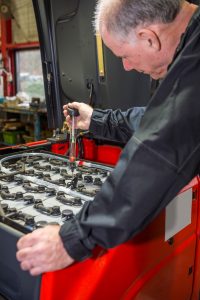 Traction batteries are used for electric forklifts and sweepers, as well as other devices powered by chemical energy source. We offer any solutions that will satisfy the most demanding customers. And so the classic acid batteries, gel batteries, allowing to limit the saturation of nickel-cadmium (alkaline) batteries, and the biggest hit of recent years – the lithium-ion batteries.
Traction batteries are used for electric forklifts and sweepers, as well as other devices powered by chemical energy source. We offer any solutions that will satisfy the most demanding customers. And so the classic acid batteries, gel batteries, allowing to limit the saturation of nickel-cadmium (alkaline) batteries, and the biggest hit of recent years – the lithium-ion batteries.
If you need a full set of batteries, cells, blocks or special solution – we are sure to have them in our proposal.
Acid traction batteries PzS are used for power supply drive units of forklifts, platforms, cleaning machines and hybrid drive units. They are designed for each type of work from light to heavy in one and multi-shift cycles. For this solution the manufacturer recommends charging from 5.5H to 12h. Solid batteries in a classic solution. The option possess: water refilling systems AQUA / BFS, electrolyte circulation systems EUW, level of electrolyte sensor in battery.
We also offer batteries PzB (British Standard).
Gel traction batteries EPzV are used for power supply of drive units in forklifts, platforms, cleaning machines, road vehicles and hybrid drive units. Their specific properties provide security of actions, max safety for the environment, and no need of daily maintenance to replenish electrolyte, all these cause that this solution is most often selected for work in warehouses, pharmaceutical plants, food and chemical industries as well as in confined premises with limited ventilation. They are designed for standard operation in one and multi-shift with charging possibility from 10h to 14h.
Lithium-ion batteries reduce total cost (TCO) of your forklift fleet Lithium batteries are 50% lighter and 30% smaller than comparable lead-acid batteries.
Advantages and properties of lithium-ion batteries:
- fast charging
- recharge at any time (40% charge during 0,5 h)
- 100% charge during 2,0 h
- long service life > 3000 cycles
- approx. 30% lower energy costs
- approx. 75% lower inspection costs
- approx. 60% lower battery maintenance costs
- maintenance-free, no need to add water
- lower operating costs
- reliable
- more energy and lower costs thanks to recharging
- no need for a second battery
- higher efficiency
- no gas emission
- low self-discharge
- energy recovery from recuperation
- stand-by mode
- environmentally friendly
- recovery by recycling
- lack of central accumulator facility
- no hardware required to replace battery
- possibility of ventilation systems eliminating
- no central water refilling
- shorter route to charging station
- read data on laptop via infrared interface
- actual measurement data
- archiving measurements
Nickel-cadmium (alkaline) batteries are used especially at low operating temperatures as these batteries have an increased resistance to low temperatures.
Monoblocks traction acid, AGM and gel are used to power drives in forklifts and platform trucks and cleaning machines, but are also used to power wheelchairs for disabled and other vehicles.
Carry out registration, analysis of the state and load your battery fleet.
For safe and effective operation, it is necessary today to possess many industrial trucks equipped with electric batteries.
Control during charging and discharging of traction batteries, temperature monitoring, battery electrolyte level is important at any time to ensure maximum uptime of the vehicles.
Registration of battery data and monitoring the status of battery is also extremely important for the constantly expanding market of leasing and long-term rent when reliable operation of battery over a long period of time is guaranteed.
Systems of water refilling BFS (AQUA)
batteries of new generation are supported by systems of water refilling, daily service becomes easy and simple due to installation of battery system BFS/AQUA. It is a set of plugs with floats connected by PVC tubes and ending with fast connector to tank with distilled water. After connecting, water automatically flows into all cells simultaneously. The level is controlled by floats which cut off water at the required level of electrolyte for the cell. It protects batteries and extends battery life.
Systems of electrolyte circulation EUW (EC)
batteries of new generation are supported by electrolyte circulation systems for artificial electrolyte mixing to artificial electrolyte for faster and evenly battery charge. EUW system reduces charging time of 2 hours and reduces energy and water consumption in batteries. In addition, it lowers charging temperature and significantly extends battery life, reduces running costs and extends the period to the next investment.
Electrolyte level sensor
informs staff about the need to add water as low level of electrolyte causes damage of separation in the cell and this leads to cells damage.
Sensor of electrolyte presence in box
Warns user against enclosure damage because of improper daily handling.
Sensor of batteries overheating
One of the major factors damaging batteries is temperature exceeding 45°C and 55°C is critical. Warns user against battery damage because of improper daily handling. Warns when maximum temperature is exceeded.
